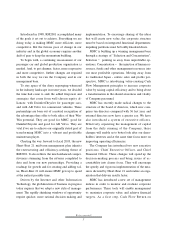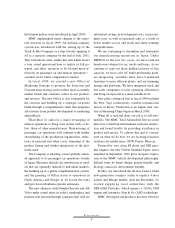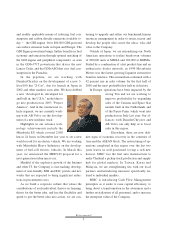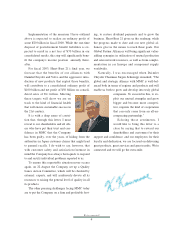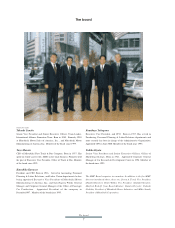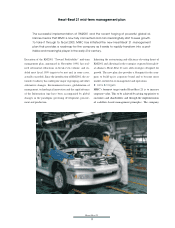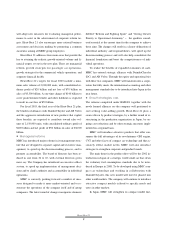Mitsubishi 2000 Annual Report Download - page 15
Download and view the complete annual report
Please find page 15 of the 2000 Mitsubishi annual report below. You can navigate through the pages in the report by either clicking on the pages listed below, or by using the keyword search tool below to find specific information within the annual report.
13
On the analyst's couch: 2000
13
H: How would you rate your own performance over the last
year?
K: In our business, the bottom line is that you have to pro-
duce the results, deliver the goods. In as much as we
failed to achieve our income targets, I suppose a "C"
grade would be appropriate. Some might point to the im-
pact of the stronger Yen as a major factor, but that's not
my style. In running a business, certain things are re-
quired of the president, including: keeping the organiza-
tion on its toes; and, establishing the kind of corporate
culture, working environment and mindset that encour-
age new ideas and viewpoints. One of our major achieve-
ments over this last year has been the introduction of the
executive officer system −still a comparative rarity in
Japan. I believe you have to separate capital management
from the daily running of the company, and the new sys-
tem now enables us to do so. Mind you, and I'm includ-
ing myself when I say this, perhaps we should have tried
to bring down the average age of our senior management
team!
H: As president, what do you attach most importance to in
your plans for fiscal 2000, now that everyone at MMC
appears to be moving in the right direction?
K: My topmost priority is to ensure that our alliances with
DaimlerChrysler and AB Volvo run smoothly and suc-
cessfully. The alliances per se are not the objective: but
they do enable us to get to the start line. If we fail to
make the most of the opportunities these alliances pre-
sent, we will be facing a very dim future. The key to suc-
cess in these alliances lies in new model projects. In our
alliance with DaimlerChrysler, the major areas of collab-
oration will be the "Z-Car" project; the Asian market, for
DC; and the European market for ourselves.
In our collaboration with AB Volvo, we first have to
spin off our truck and bus operations into a separate com-
pany and prove that it is capable of standing on its own
feet as an independent entity.
If MMC is to become more market oriented, we have
to convince the whole organization of the necessity of
executing our passenger car strategy along more market-
oriented lines; something I have been advocating from
the beginning of my presidency. There are two facets to
this: (1) Proving our engineering thesis and goal that we
can build high quality products at low cost; (2) The ne-
cessity to develop new marketing techniques for the
products that result from that thesis, and getting away
from product selling methods that are simply extensions
of how we have done things in the past.
It is no good flopping around complaining that we
were unable to foresee the advent of e-commerce and
other such developments. In running the business, we
must have the ability and confidence to predict such de-
velopments and be able to say that they came within our
range of forecasts.
Telling the customer that a new model is a good prod-
uct is simply not enough. We have to manage the compa-
ny so that it can accommodate and turn to our advantage
developments not previously encountered. This is a pri-
ority task for our management team and this is the drum I
have been beating over the last three years. I believe that
the message has really started to get through over the last
year.
U: Would you tell us something about the timing of the al-
liances and the synergies you expect?
K: There was nothing intentional about the timing. Looking
at the state of the auto industry in general, it was pretty
obvious two years ago that the situation would get a lot
tougher in a number of ways. I was none too optimistic
about any significant growth in the Japanese truck mar-
ket. With four truck manufacturers and a market that is
only big enough for two, we are going to have to make
sure we are one of the two that survives.
MMC went through a stage where its commercial ve-
hicle and passenger car operations were mutually sup-
portive; propping each other up as required. Today, how-


